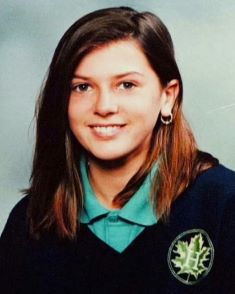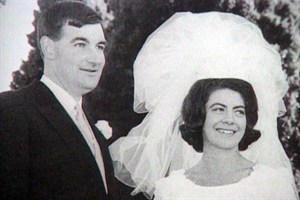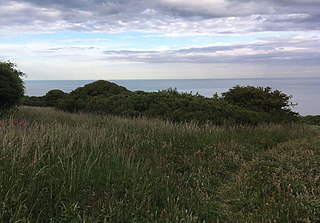Related Research Articles

Lesley Molseed(14 August 1964 –5 October 1975), born Lesley Susan Anderson, was an English schoolgirl who was abducted and murdered on 5 October 1975 in West Yorkshire. Stefan Kiszko, an intellectually disabled man who lived near Molseed's residence in Greater Manchester, was wrongly convicted in her murder and served sixteen years in prison before his conviction was overturned. His mental and physical health had deteriorated in prison, and he died twenty-two months after his release in February 1992 – before he could collect the money owed to him for his wrongful conviction. Kiszko's ordeal was described by one British MP as "the worst miscarriage of justice of all time."

Billie-Jo Margaret Jenkins was an English girl who was murdered in Hastings, East Sussex in February 1997. The case gained widespread media attention and remains unsolved.
On the evening of 19 March 1949, in Cameo cinema in Liverpool, England, a double murder took place which led to a miscarriage of justice and the longest trial in British history at the time.
Rachel Jane Nickell was a British woman who was stabbed to death on Wimbledon Common in south-west London on 15 July 1992. The initial police investigation of the crime resulted in the arrest in controversial circumstances of an innocent man, who was acquitted. Her killer, Robert Napper, was identified by a later police investigation and convicted in 2008.

David Harvey Crewe and Jeannette Lenore Crewe were a New Zealand farming couple who were shot to death in their home on or about 17 June 1970. The murders led to the wrongful conviction and subsequent pardoning of another farmer who lived in the district, Arthur Allan Thomas. A Royal Commission set up to investigate the miscarriage of justice found that a detective had fabricated evidence and placed it at the scene of the crime. No person was ever charged with planting the evidence, and the murders remain unsolved.

The Green Bicycle Case was a British murder investigation and subsequent trial pertaining to the fatal shooting of Bella Wright near the village of Little Stretton, Leicestershire, England, on 5 July 1919. Wright was killed by a single bullet wound to the face. The case takes its name from the fact that on the evening of her death, Wright had been seen cycling in the company of a man riding a green bicycle.

The World's End Murders is the colloquial name given to the murder of two girls, Christine Eadie, 17, and Helen Scott, 17, in Edinburgh, in October 1977. The case is so named because both victims were last seen alive leaving The World's End pub in Edinburgh's Old Town. The only person to stand trial accused of the murders, Angus Robertson Sinclair, was acquitted in 2007 in controversial circumstances. Following the amendment of the law of double jeopardy, which would have prevented his retrial, Sinclair was retried in October 2014 and convicted of both murders on 14 November 2014. He was sentenced to life imprisonment with a minimum term of 37 years, the longest sentence by a Scottish court, meaning he would have been 106 years old when he was eligible for a potential release on parole. He died at HM Prison Glenochil aged 73 on 11 March 2019. Coincidentally, he died on the same day the BBC's Crimewatch Roadshow programme profiled the murders.

The Peasenhall murder is the unsolved murder of Rose Harsent in Peasenhall, Suffolk, England, on the night of 31 May 1902. The house where the murder occurred can be found in the centre of the village, on the opposite corner to Emmett's Store. It is a classic 'unsolved' country house murder, committed near midnight, during a thunderstorm, and with ingredients of mystery.

The murder of Linda Cook was committed in Portsmouth on 9 December 1986. The subsequent trial led to a miscarriage of justice when Michael Shirley, an 18-year-old Royal Navy sailor, was wrongly convicted of the crime and sentenced to life imprisonment. In 1992 his case was highlighted as one of 110 possible miscarriages of justice in a report presented to the Home Office by the National Association of Probation Officers and justice groups Liberty and Conviction. His conviction was eventually quashed in 2003 by the Court of Appeal after the DNA profile extracted from semen samples recovered from the victim's body was proven not to be his. Cook's murder took place shortly after six sexual assaults had been committed in the Buckland area of the city, and the killer was initially dubbed the Beast of Buckland by the news media. When police revealed that footprint evidence had been recovered and launched a search for matching shoes, the case became known as the "Cinderella murder". Because of the brutal nature of the murder and the preceding sex attacks, Hampshire police were under public pressure to quickly make an arrest.

Peter Britton Tobin was a Scottish convicted serial killer and sex offender who served a whole life order at HM Prison Edinburgh for three murders committed between 1991 and 2006. Police also investigated Tobin over the deaths and disappearances of other young women and girls.

Philip John Smith is an English spree killer serving a life sentence for the murders of three women in Birmingham in November 2000. A former fairground worker employed at the Rainbow pub in Digbeth, Smith killed his victims over a four-day period. All three victims were mutilated almost beyond recognition, but Smith was quickly identified as the killer on the strength of overwhelming evidence.

Sharon Kinne, also known as Jeanette Pugliese, La Pistolera in Mexico, and Diedra Glabus in Canada, was an American murderer and prison escapee who was convicted in Mexico for one murder and is suspected of two others in the United States, one for which she was acquitted at trial. Kinne was the subject of the longest outstanding arrest warrant for murder in the history of Kansas City, Missouri, and one of the longest outstanding felony warrants in U.S. history. In January 2025, it was announced that Kinne had been living in the small Canadian town of Taber, Alberta, from approximately 1973 until her death in 2022.

Grégory Villemin was a French boy from Lépanges-sur-Vologne, Vosges, who was abducted from his home and murdered at the age of four. His body was found four kilometres (2.5 mi) away in the River Vologne near Docelles. The case became known as the Grégory Case and for decades has received public interest and media coverage in France. The murder remains unsolved.
Simon Dale was an English retired architect whose murder in September 1987 remains unsolved. Described as "an eccentric recluse", Dale was found bludgeoned to death in his countryside mansion in Heath, Herefordshire, England. The only suspect, Dale's former wife Baroness Susan de Stempel, was cleared of his murder due to insufficient physical evidence. The case is noted as being "one of West Mercia Constabulary's relatively few unsolved murders".

Jessie Earl was a 22-year-old student who disappeared from Eastbourne, England in May 1980. It was not until 1989 that her remains were discovered in thick undergrowth on Beachy Head, where she would regularly take walks.
Alun Kyte, known as the Midlands Ripper, is an English double murderer, serial rapist, child rapist, paedophile and suspected serial killer. He was convicted in 2000 of the murders of two sex workers, 20-year-old Samo Paull and 30-year-old Tracey Turner, whom he killed in December 1993 and March 1994 respectively. After his conviction, investigators announced their suspicions that Kyte could have been behind a number of other unsolved murders of sex workers across Britain in the 1980s and 1990s. He was apprehended due to the ground-breaking investigations of a wider police inquiry named Operation Enigma, which was launched in 1996 in response to the murders of Paull, Turner and of a large number of other sex workers. Kyte was sentenced to a minimum of 25 years imprisonment for the murders of Paull and Turner.
Chris Clark is a British amateur crime writer who writes chiefly about serial killers and their supposed links to unsolved crimes. He is a retired police intelligence officer who worked in the King's Lynn area for Norfolk Police, although his career was somewhat unsuccessful and he had three applications to join the new National Criminal Intelligence Service rejected in 1993, with the commanding officers unimpressed by his record and applications. In 2022, his book Yorkshire Ripper: The Secret Murders, which was jointly written with journalist Tim Tate and alleged links between Peter Sutcliffe and unsolved murders, was made into an ITV prime-time documentary series of the same name.

On 1 August 1992, Helen Gorrie, a 15-year-old British schoolgirl was found half-naked and strangled in the grounds of Merchistoun Hall in Horndean, after going out one night to meet a 21-year-old man named John Corcoran.

The murder of Elizabeth McCabe was the infamous murder of a 20-year-old woman in Dundee, Scotland in February 1980. The case is one of Scotland's most notorious unsolved murders, and led to one of Scotland's largest manhunts. McCabe had disappeared after a night out at Teazer's Disco in Dundee city centre, and was found strangled to death two weeks later in Templeton Woods on the outskirts of the city. This was only 11 months after another woman, 18-year-old Carol Lannen, had been found dead only 150 yards away in the same woods, leading to the killings being labelled the Templeton Woods murders in the press and causing many to fear that there was a serial killer at large in the city at the time, although police have not linked the murders.
References
- 1 2 3 4 5 6 "Unsolved murder was 'too long ago' for killer to be tried". Birmingham Post. Trinity Mirror. 19 August 2008. Archived from the original on 21 February 2013. Retrieved 17 February 2012.
- 1 2 Campbell, Duncan (30 November 2007). "Man, 70, charged over teenager's 1961 murder". The Guardian. Archived from the original on 6 October 2014. Retrieved 17 February 2012.
- 1 2 3 4 5 6 7 Cowan, Mark (3 June 2010). "Did this man escape justice for Jackie's murder?". Birmingham Mail. Trinity Mirror. Retrieved 17 February 2012.
- ↑ Birmingham Daily Post - Thursday 07 December 1961
- 1 2 Tyler, Jane (9 December 2011). "Notorious 1960s murderer dies in prison, aged 74". Birmingham Mail. Trinity Mirror. Archived from the original on 21 February 2013. Retrieved 17 February 2012.
- ↑ "Man, 70, charged with 1961 murder". BBC News. BBC. 29 November 2007. Retrieved 17 February 2012.